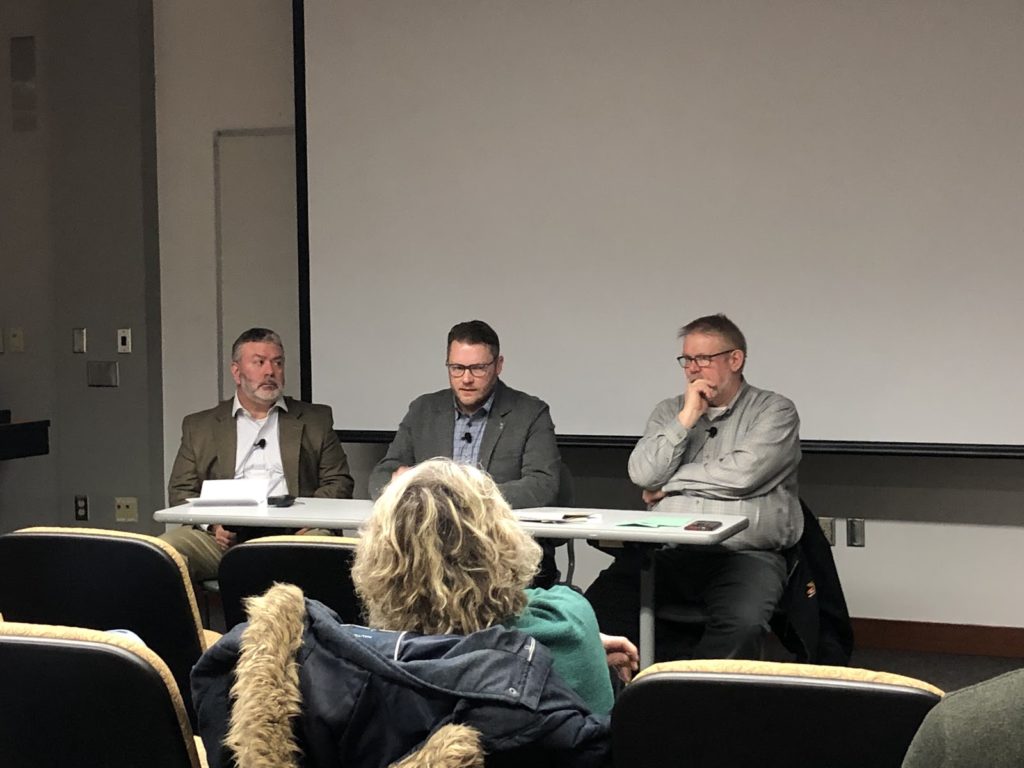Gov. Gretchen Whitmer’s chief strategist visited NMU for a panel discussion last week to break down key issues the new administration hopes to resolve, including infrastructure, education and civil rights.
Invited by the Political Science Department, Mark Burton — 1999 NMU graduate and Champion native — talked to a group of community members, faculty and students on Feb. 14 in the Mead Auditorium in the West Science Building, noting some of the topics Whitmer addressed in last Tuesday’s State of the State.
Infrastructure was a key issue for Whitmer during her campaign. She talked about it at rallies and campaign stops so often, Burton said she’s sometimes known as the “Fix-the-damn-roads Lady.”
“We have the worst roads in the country, it does not matter where you are in the state. We have over 3,000 bridges that are on the critical bridge list, which is really scary to think about. They’re not just two-lane road bridges, we’re talking about in some cases six lanes [of] traffic going each way,” Burton said. “I think the solution has always been present. You can’t build the roads if you don’t have money to build them.
“By letting roads that are in good condition fall into fair condition. The cost of maintenance goes up dramatically…our poor roads are dramatically increasing and you cannot repave a poor road because you will be doing it again in five years. You need to rebuild that road.”
Burton said Whitmer will “lay out specifics” in her budget proposal during the first week in March. The biggest test, however, will be convincing legislators on both sides of the aisle to vote “yes.”
Education is another issue Burton touched on, noting how Michigan’s education system has been on a state of decline since 2003. For instance, the number of at-risk students has increased from 24 percent to 49 percent today, Burton continued, explaining, that the “per-pupil funding” method is not efficient in helping support those at-risk students.
“At-risk children research continually demonstrates [they] are more expensive in terms of some of the supports they need and some of the wrap-around services they need to be able to leave the system and be college-ready or career-ready. So we have a massive problem there too,” he said.
There’s been several studies to better fund education, and the path forward is to reconstruct the system so that it is “equity-based” instead of “equality-based.” The state needs to provide money for each student’s needs, they’re not all “widgets” that are equal and learn the same way, he said.
Burton also said Whitmer hopes to revisit the Elliott-Larsen Civil Rights Act and add more language to it so it will cover and help protect LGBT Michiganders.
“So many of the challenges that present themselves now whether it’s roads and bridges, K-12 funding, drinking water infrastructure, they’re all state-wide issues at this point. When we view issues through a state-wide lens, it’s obviously complex,” he said.
Political science professors Brian Cherry and Steve Nelson, who moderated the event, opened the discussion by acknowledging Burton’s road to success at such a young age. Burton humbly noted that his success came from listening and learning from his professors here at NMU and jumping at any opportunity along the way.
“I think one of the best things I’ve been able to do is say ‘yes’ when good opportunities come along. There are always reasons to say ‘no.’ At the time I was young, so [I had] to figure out how to get my mom to drive me places,” Burton said on his rise up the ladder. “That really pushed me even when I was 13 years old to start talking with adults more and be better at asking questions.”
As a chief strategist, Burton said he doesn’t have a checklist as to what his duties are, but he is the one whom Gov. Whitmer “trusts” to go into other people’s “lanes” and “prioritize” matters that are crisis, such as the recent federal government shutdown and the polar vortex storm where the administration asked everyone in the Lower Peninsula to turn down their thermostats to 65 degrees.
“My role can be a number of different things. Every governor has somebody that’s close to them and that they trust to help get the right information to analyze that information and bring it to the governor so she can feel good to make decisions and there’s nothing missing,”
Burton said.
























